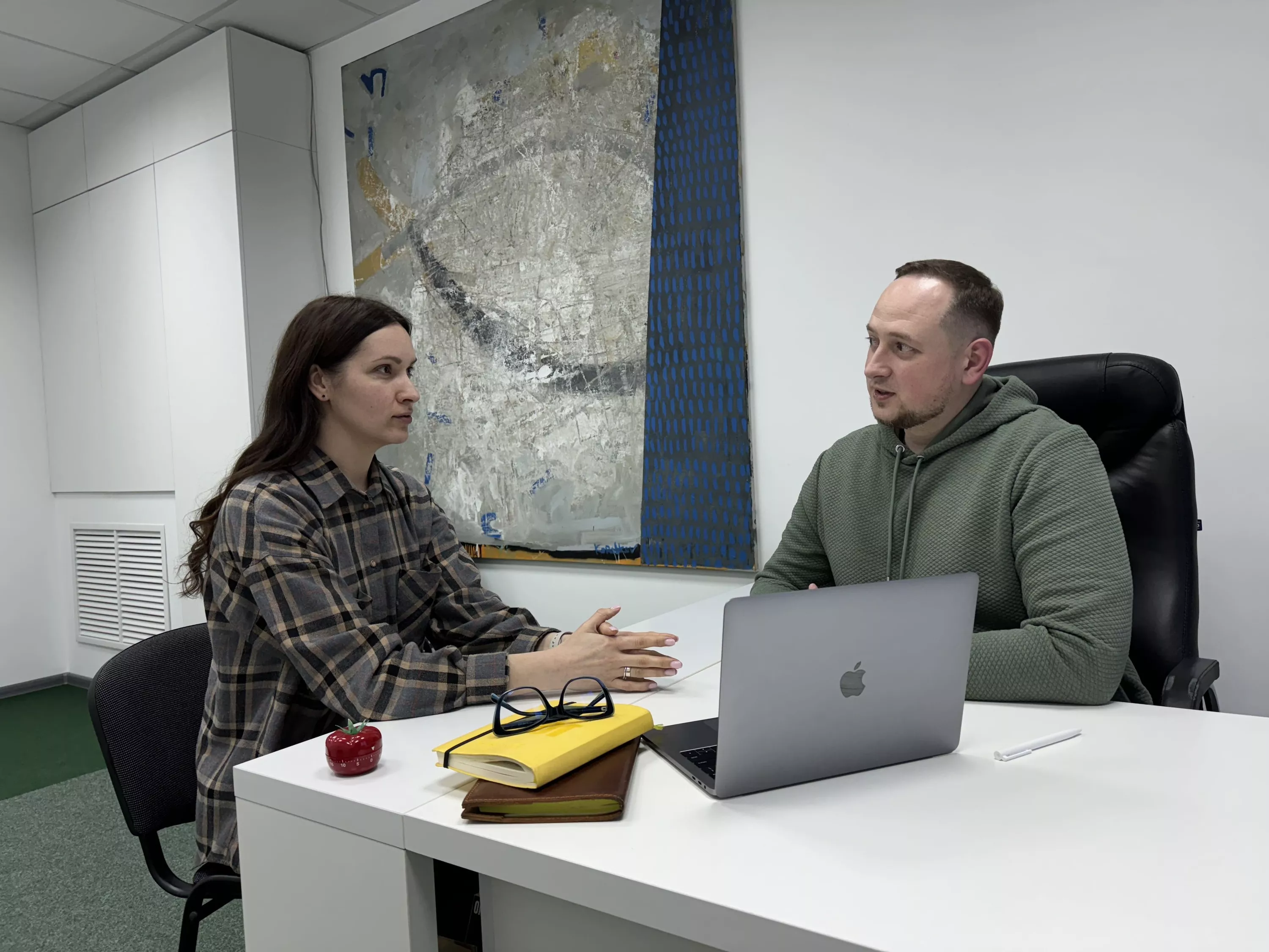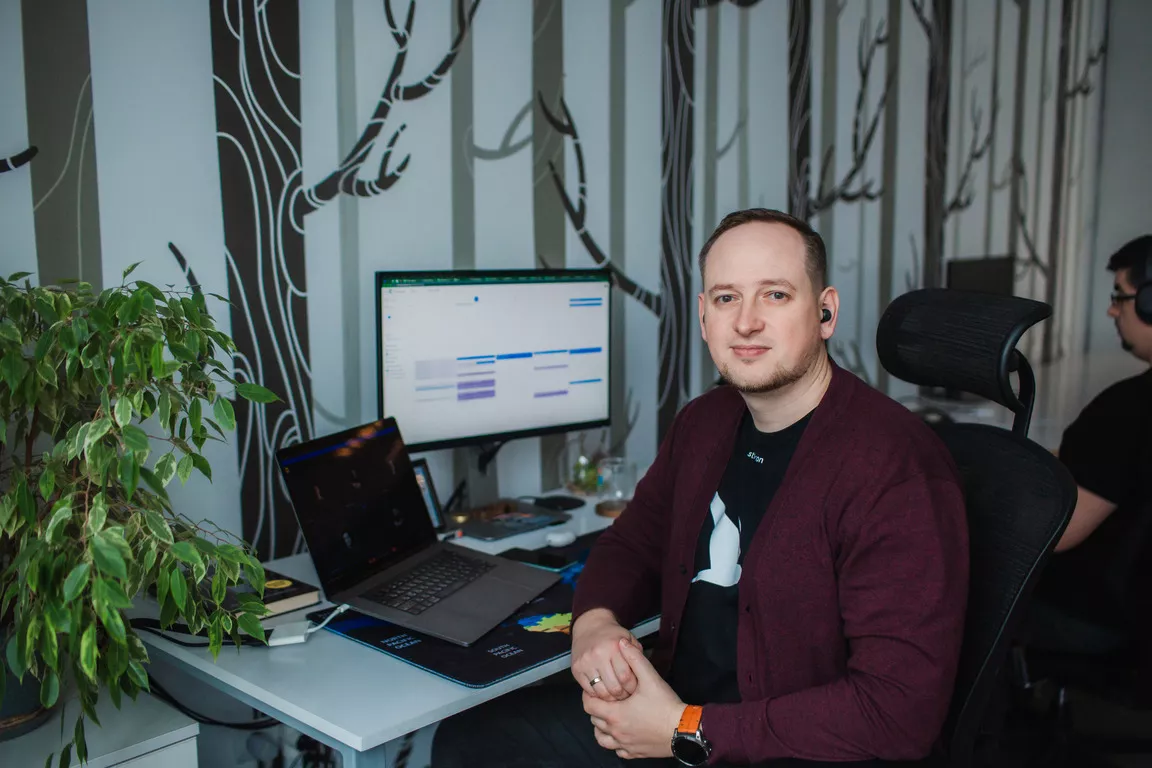
The technological world is becoming more complex every year, and the needs of large companies are growing. To keep up with innovations, some businesses build internal development teams, while others outsource development. Stfalcon IT company is confident that both options can be profitable solutions. To choose the best option, you need to take into account the goals and long-term business strategy, as well as the specifics and subject matter of the project.
Yulia Kondratiuk, CBDO Stfalcon, and Oleksandr Zozulia, CTO Stfalcon, spoke about the global trends in the market, the needs of large companies, and the advantages and disadvantages of in-house vs outsourcing software development.

How Large Companies Approach In-house vs Outsourcing in 2025
According to Zippia statistics, the biggest supporters of outsourcing are large international companies. Among the companies on the Forbes Global 2000 list, the vast majority - 92% - outsource IT operations, according to ISG Research. This allows businesses to save time and resources required for development and focus on their core tasks and competencies.
The trend towards IT outsourcing has been steady in recent years, which confirms the annual growth of this industry. According to Statista, while the global software outsourcing market was estimated at $430 billion in 2023, it will reach $512.50 billion in 2024.
Gartner predicts that in 2024, spending on IT services in Europe will grow by 11.8% and globally by 8.7%, reaching $1.5 trillion. This is partly due to a lack of staff in IT departments, as well as the desire of companies to invest in organizational efficiency and optimization.
According to Oleksandr Zozulia, CTO at Stfalcon, IT development services are sought by both companies that do not have their own IT departments and those that do have such teams but lack the expertise, free resources, or sufficient experience to implement their projects. Often, large businesses have tight deadlines and are looking for suggestions on how to develop certain functionality on time.
"At the same time, outsourcing is not for everyone. We have had cases when, at the negotiation stage, we realized that the best option for the client would be to form their own development team. Both outsourcing and in-house development have their strengths and weaknesses, which need to be taken into account and an individual decision made for each business," says Yulia Kondratyuk.
In-house Software Development: Pros, Cons, and Use Cases
With in-house development, you can create a cohesive team with fast communication and support. But it's expensive, carries a high risk of staff turnover, and requires ongoing investment in training. Let’s explore the pros and cons of in-house development in more detail below.
Advantages of In-house Software Development
1. Alignment with culture. When you develop a project in-house, you can build a team that aligns with your company's culture and core values. This alignment fosters a strong sense of responsibility, commitment, and motivation. Teams that share the same goals and work in synergy often achieve better results. It can be challenging to ensure that the external team fully embraces the startup's culture and values when outsourcing. This internal cohesion can contribute to the project's success and the company's overall growth.
2. Direct communication. One key advantage of an internal team is the ease and speed of communication. When everyone works under one roof, you can engage in face-to-face discussions, which helps speed up decision-making. There is no need to exchange emails for long or wait for responses in different time zones. This direct, real-time interaction can ensure everyone is on the same page.
3. Immediate support and problem resolution. After rolling out a new product or feature, it's almost inevitable that bugs or issues will arise. Having an in-house development team means that any issues can be resolved immediately. The team can quickly investigate problems and apply fixes without significant delays.
Outsourced teams may not be immediately available to address urgent matters if they work with multiple clients or in different time zones. With an in-house team, you benefit from quick response time and focused attention to resolve any issues that arise after launch.
Disadvantages of In-house Software Development
1. It's expensive. Hiring your team has both visible and hidden costs. The average salary for an IT developer in the US is around $71,508, but that's just the beginning. You'll also have to pay for sick leave, vacation, insurance, social security, and recruiting. Even when the team is not working on a project, they still need to be paid.
2. High risk of staff turnover. IT professionals are in high demand, and keeping talent from being lured away by other companies can be challenging. You may have to offer better salaries and benefits to retain your team, which can increase your payroll. If you don't, you risk losing valuable team members.
3. Training costs. The world of technology is changing rapidly, so it's up to you to ensure your team is up to date with new technologies. This means investing in training and development, which can add up and affect your business's finances.
When In-house Development Makes Sense
Despite the higher costs associated with in-house development, the advantages can outweigh the disadvantages.
Building an in-house team provides more control if budgetary constraints are not a concern. With a team in place, you can monitor progress and address issues immediately. Direct communication and immediate access to your team help ensure quick adjustments and decision-making. Internal teams also foster a sense of ownership and commitment, which leads to a cohesive and motivated workforce.
In-house Development: Control and Security
Several large companies, such as OLX, lifecell, Vodafone, NOVUS, Eldorado, OKKO, and BlaBlaCar, prefer to work with outsourcing companies. While organizations such as Uklon, Kyivstar, Rozetka, MEGOGO, EVA, and PrivatBank are developing their own software development teams. Often, companies that are not related to the IT industry but need to implement or support certain IT products follow the same path.
"Sometimes, a project requires special developer skills or compliance with strict security rules due to working with sensitive data. For example, sometimes this may be a requirement of the project's investors. In this case, it makes sense to develop your own expertise in order not to depend on a third party and avoid information leakage," says Yulia Kondratiuk.
Another advantage of in-house development is fast communication. When there are no intermediaries between developers and customers, it is easier to resolve certain misunderstandings and balance opposing views, especially if all participants in the process physically work in the same office.
Another case is project support. If the priority is responding to incidents that may occur during the service operation, and the amount of work does not allow the development team to work full-time, then building in-house support is the best option. This will significantly optimize support budgets and allow you to fully manage your staff's work schedule 24/7.
Outsourcing Software Development: Pros, Cons, and Use Cases
Outsourced development means hiring an external company to build your product instead of doing it in-house. This is usually done through a contract in which all the project details are handed over to the external team.
Outsourcing is popular because it is cost-effective and can be easily scaled, which sets it apart from in-house development. IT services account for 75% of all global outsourcing contracts (ISG). The sector grew to $30.4 billion, a 13% increase from the previous year, making it the best year. Large companies like Google and Slack use outsourcing for their IT projects.
Advantages of Outsourcing Software Development
1. Cost-effectiveness. Outsourcing allows you to access high-quality expertise at a lower cost by attracting firms from countries like Eastern Europe.
2. Access to a global talent pool. Outsourcing means you are not limited to local candidates. Instead, you can choose from a wide range of qualified professionals worldwide, making finding the right talent for your needs easier.
3. Technological flexibility. Some projects require specialized skills in different technologies. Outsourcing allows you to work with multiple IT companies. Each has expertise in different areas, ensuring you get the best technology solutions.
Disadvantages of Outsourcing Software Development
1. Limited control. Unlike an in-house team, an outsourced team may not be dedicated exclusively to your project. This can lead to less control over development progress and slower bug fixes.
2. Communication problems. Working with a team in a different time zone can make scheduling meetings difficult. Language barriers can also cause miscommunication and delays if the outsourced team struggles to understand your requirements.
3. Trust. Outsourcing involves transferring confidential information to a third party. It is crucial to carefully vet the agency, understand its privacy policy, and use legal agreements such as NDAs to protect your interests.
When Outsourcing Is the Better Choice
Outsourcing development can be a wise choice if you're working on a tight budget and want to avoid the cost of hiring an in-house team. It also provides access to a broader range of talent if local experts are hard to find. If you have a tight deadline, experienced outsourced teams can handle tasks efficiently, minimizing the risk of delays. Outsourcing can help translate business requirements into technical terms by providing suppliers.
Outsourcing Software Development: Speed and Scalability
According to Deloitte, the most common reasons for outsourcing are to reduce operating costs, focus on the core business, solve scaling problems.
A company needs to gain experience in technical hiring to create its in-house development team. After all, recruitment involves several related processes: onboarding, providing everyone with hardware, software, and licenses, organizing a social package, and legal and accounting support. This incurs high overhead costs, both in terms of time and money.
"If a business is not engaged in software development and does not plan to implement a large volume of projects, it makes sense to outsource some of the work. This way, the company gets access to qualified developers and established processes. If one of the engineers suddenly drops out of the process, the vendor will quickly find a replacement. The client does not have to dive into technical or personnel details, so they can focus on the result and the implementation of the project in their business," explains Oleksandr Zozulia.
Another factor in high-quality development is the experience and cohesion of the team. To do this, the team must have implemented at least a few successful projects in a particular domain, and then it gains niche expertise.

For example, Stfalcon has been developing custom web services and mobile applications for logistics, transportation, travel, delivery, healthcare, and fintech projects for 14 years. After dozens of projects, the company knows all the possible standards of these industries, pitfalls, and common mistakes. This means that it can help clients get from idea to result, avoid unnecessary costs, and find ways to optimize certain solutions.
"We have a separate segment of projects where we increase the efficiency of the client's business processes. For example, for a logistics company, we created software that allows optimizing work schedules of staff in branches. And our solution for a heavy industry company helps the client save time and fuel by optimizing courier delivery routes," says Oleksandr Zozulia.
Want a web app that does more?
Let's build a solution that's smart, sleek, and powerful.
Alina
Client Manager

He emphasizes that for large businesses, the timing of a project is often crucial. Outsourcing allows you to get started quickly, which would be difficult to achieve if you built your own in-house development team from scratch.
In-house vs Outsourcing Software Development: Key Differences
When choosing between in-house development vs outsourcing, it's essential to understand the critical differences. Each comes with benefits and challenges that affect how you manage projects, control costs, and align teams with company goals. Here's a simple analysis to help you choose the best option.
- Expertise and access to skills. Outsourcing provides specialized skills and knowledge from external experts. Internal staff relies on your team's skills, which may need more specific specialized knowledge.
- Control and communication. Outsourcing can lead to communication issues and less direct control, especially if the team is in a different location. Internal teams offer more immediate and direct communication and control.
- Costs and budgeting. Outsourcing can be cost-effective for short-term projects without long-term employment costs. In-house software development involves fixed costs such as salaries and benefits, but can be more cost-effective for ongoing needs.
- Flexibility and scalability. Outsourcing allows you to scale up or down quickly, depending on project needs. Internal teams are less flexible and may require time to recruit and train staff to change team size.
- Project alignment and company culture. Outsourced teams may not be aligned with your company's goals and culture. Internal teams are more integrated into your company's culture, which leads to more cohesive work.
When deciding between in-house vs outsourcing website development, factors like cost, control, and the expertise required for your project must be considered.
Hybrid Development Model: Combining In-house and Outsourcing
Even if a company decides to build an IT team internally, it may not refuse to outsource at the same time. For example, Google develops key products in-house and delegates non-core functions, such as administration and IT work, to vendors, as it is impossible to perform all tasks internally.
"We have companies among our clients that prefer a hybrid development format. As a rule, these are really big businesses. They have their own IT department, but they often lack their own engineers, expertise, and time. That's why they outsource part of the development to us," says Oleksandr Zozulia.
According to him, the hybrid approach combines the advantages of both in-house teams and outsourcing. The client has the opportunity to look at the development from a different angle, as well as compare the speed and quality of their IT team's work with the results of the outsourcers' work and draw conclusions.
Such cooperation also allows developers to exchange experience. Outsourced development teams are usually used to working at a faster pace. Unlike product teams, they have more diverse experience in using technology. Stfalcon has had cases where clients' in-house teams have adopted some of their approaches and started using them in their own practice.
"In addition, a big plus for the client is the ability not to increase the size of the in-house team in circumstances where the workload has temporarily increased. In this way, the company gets rid of additional costs associated with the search, hiring and retention of new employees, but achieves its business goals with the help of an outsourced team," adds Stfalcon CTO.
How to Choose Between In-house and Outsourced Development
If a business understands why it needs to hire an in-house development team, it makes sense to invest in building one. In other cases, when a company needs one-time IT services, seeks to optimize costs, or does not want to deviate from its core specialization, outsourcing is worth considering.
"Developing your own team can take years. If there is a need for a quick result, there is no alternative to outsourcing, in my opinion. This is how the economy works: delegation of certain types of work to a contractor as opposed to developing in-house expertise," says Oleksandr Zozulya.

Yulia Kondratyuk warns that it is important to choose a service company carefully. She cites examples of clients choosing other vendors because of cheaper prices and a quicker promised deadline, and then returning to Stfalcon. Therefore, you should not chase unrealistic estimates. Instead, quality service will be the key to successful long-term cooperation.
Stfalcon has experience in software development cooperation with various businesses. Both enterprise and medium-sized companies. Enterprise companies usually develop with their in-house team but often need additional resources. In this case, Stfalcon offers outstaffing cooperation, strengthening the client's team with developers with the appropriate expertise.
Medium-sized companies are more likely to choose outsourcing. Having an idea and funds, they seek full-cycle implementation and expertise: from R&D to the release of a finished product.
"When working with such clients, we conduct a Discovery phase before the start of development. It allows us to test the idea, outline it, and prepare documentation to move forward. Our approach to development is based on flexible management methodologies so that our clients can maintain control over the project at every stage and get the highest quality results," says CBDO Stfalcon.
A mix of outsourcing and outstaffing is common when working with one client. Depending on the business goals, each client selects the best option for cooperation.
Final Takeaways: Which Development Model Fits Your Business?
When considering in-house vs outsourcing pros and cons for your startup you must know the following. In-house development offers direct control and integration with your company culture. Outsourcing offers cost-effectiveness and access to specialized skills but can lead to less control. Evaluating these factors will help you decide which approach best suits your needs.
The Stfalcon team is ready to share its experience in developing and launching your business. The company's portfolio includes more than 325 completed projects. The rating on Clutch, the leading platform for ratings and reviews of the world's leading IT service providers, reaches 4.9. If you are interested in finding out the cost of your project or ordering development, let's get to know each other better.
Deciding between in-house and outsourced software development depends on budget, control, and expertise. Here are common FAQs to help you compare both options.
FAQs About In-house and Outsourced Software Development
Which is more cost-effective: in-house or outsourced software development?
When deciding between software development in-house vs outsourcing, companies need to weigh factors like cost, control, and access to skills. Outsourcing is usually more cost-effective than in-house development, especially for short-term projects.
How does control over the project differ between in-house and outsourced development?
With in-house development, you have more control over the project, workflow, and communication. This allows you to make adjustments faster and collaborate more smoothly. Outsourced development can lead to less control, as the external team may be in a different location, causing delays in feedback.
Which option is more flexible: in-house or outsourced development?
When deciding between in-house vs outsourcing, outsourcing is generally more flexible. This allows companies to increase or decrease resources based on project needs. It brings in specific expertise when needed without the long-term commitment of hiring full-time staff. In-house teams, while offering greater control, are less flexible.



